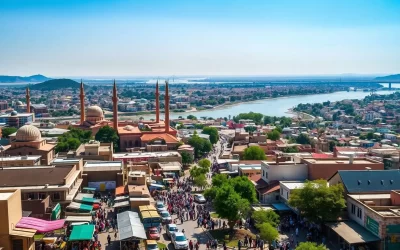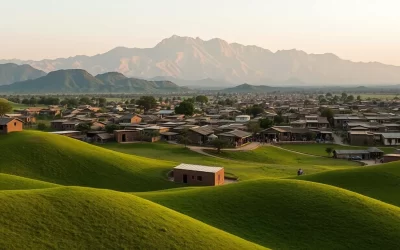✓ Accommodations✓ Flights✓ Rental Cars
Did you know that 70% of tourists prefer cash transactions when visiting unfamiliar places? This highlights the importance of understanding local payment systems before you travel. In this guide, we’ll help you navigate the essentials of visiting a unique West African country, focusing on its currency and practical tips for a smooth journey.
Whether you’re planning your first trip or are a seasoned explorer, knowing the basics of the local currency, tipping customs, and electrical standards can make all the difference. You’ll also learn why carrying Euros or US dollars for exchange is crucial and how to avoid common pitfalls when converting money.
From visa requirements to everyday travel tips, this guide covers everything you need to know. Let’s dive in and prepare you for an unforgettable experience in this vibrant country.
Travel Essentials in Niger: An Overview
Traveling to a new area means prioritizing safety, health, and logistical planning. Whether you’re visiting for the first time or returning, understanding the essentials can make your journey smoother and more enjoyable. This guide will help you prepare for the unique challenges of this region.
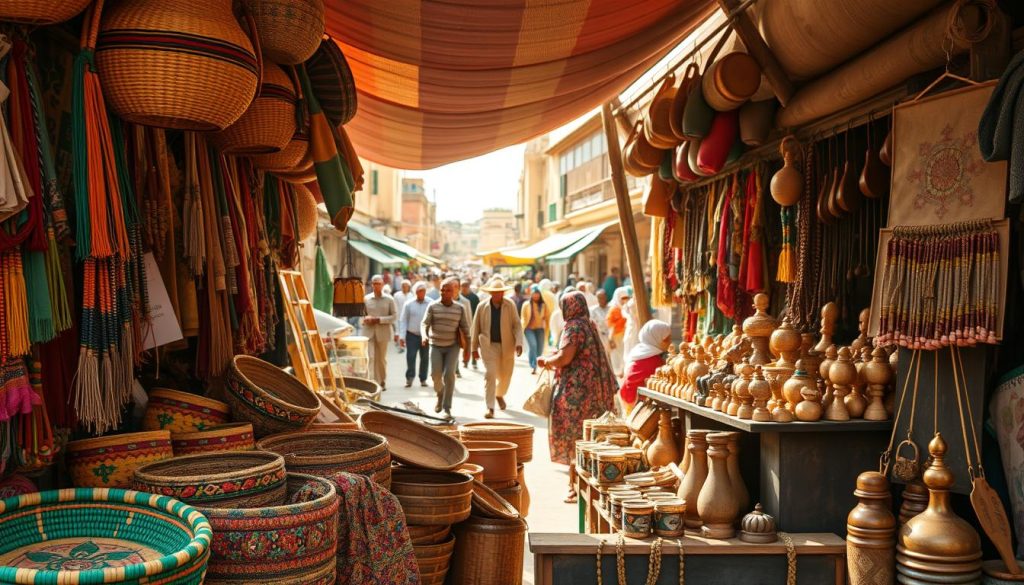
Key Travel Preparations
Before you go, ensure your routine vaccinations are up-to-date. Diseases like measles, polio, and COVID-19 are still a concern in some areas. Travel insurance is also a must, as medical facilities outside the capital are limited.
When it comes to food and water safety, always opt for bottled or treated water. Avoid tap water to reduce health risks. Stick to reliable food sources, especially in remote areas.
Local Infrastructure Insights
Transportation can be challenging, especially during the rainy season when roads may become impassable. In cities, taxis and buses are available, but road quality varies. Communication networks may also be unreliable outside urban centers.
For each person traveling, it’s important to plan ahead. Carry enough cash, as ATMs are scarce and credit card acceptance is limited. Understanding the local infrastructure will help you navigate the area more effectively.
Niger: Ultimate Travelers Guide to Currencies & Payments
Managing your finances effectively is crucial when exploring new destinations. A sound financial strategy ensures you can navigate the region without unnecessary stress. Start by estimating your daily expenses and carrying a mix of cash and cards for flexibility.
Currency exchange can be tricky, especially in areas with limited banking access. Always exchange money at trusted sources like banks or authorized dealers to avoid counterfeit bills. Timing is also key—exchange rates can vary throughout the month, so plan ahead for better deals.

Safety is another priority. In regions with higher crime rates, avoid carrying large amounts of cash. Use a money belt or hidden pouch to keep your funds secure. Ensure your passport and travel documents are always in order, especially when traveling near borders like Burkina Faso.
Managing Currency Exchange on the Go
When exchanging currency, always check the rates and fees. Airport kiosks and hotels often charge higher fees, so opt for local banks or reputable exchange offices. Digital tools and apps can help you track real-time rates and make informed decisions.
Be cautious of scams. Stick to official sources and avoid street vendors offering too-good-to-be-true rates. Keep a record of your transactions and notify your bank of your travel plans to prevent card issues.
By planning ahead and staying vigilant, you can handle your finances with confidence and minimize risks during your trip.
Understanding the West African CFA Franc
The West African CFA franc plays a vital role in daily transactions across the region. Pegged to the euro at a fixed rate of 1 euro = 655.957 CFA francs, this currency is backed by strong government policies and economic agreements. Its stability makes it a reliable choice for travelers, but understanding its mechanics is key to managing your finances effectively.
Currency Mechanics and Exchange Insights
The CFA franc is used by 14 countries in West and Central Africa, making it a unifying currency for millions. Its value is tied to the euro, ensuring minimal fluctuations. However, credit cards are seldom accepted, so cash remains the primary method of payment. Always exchange money at trusted sources like banks or authorized dealers to avoid counterfeit bills.
Here’s a quick overview of the CFA franc’s key features:
| Feature | Details |
|---|---|
| Pegged Currency | 1 euro = 655.957 CFA francs |
| Usage | 14 West and Central African countries |
| Primary Payment Method | Cash |
| Exchange Tips | Use banks or authorized dealers |
Tips for Cash-Based Transactions
Handling cash safely is crucial, especially during night travel when risks increase. For women travelers, carrying a discreet money belt or hidden pouch can enhance security. Avoid displaying large amounts of cash in public, and always keep smaller denominations for everyday expenses.
“The CFA franc’s stability is a testament to the region’s economic resilience, but travelers must remain vigilant when handling cash.”
Local government regulations also affect transactions. For example, some areas may have restrictions on currency exchange or require specific documentation. Staying informed about these rules can prevent unnecessary complications.
By following these tips, you can navigate the CFA franc system with confidence and ensure a smooth financial experience during your travels.
Payment Options and Financial Security in Niger
Exploring payment options in a new country can make or break your travel experience. In Niger, understanding the available methods and prioritizing financial security is essential. From credit cards to prepaid solutions, each option has its pros and cons. Here’s how to navigate them effectively.
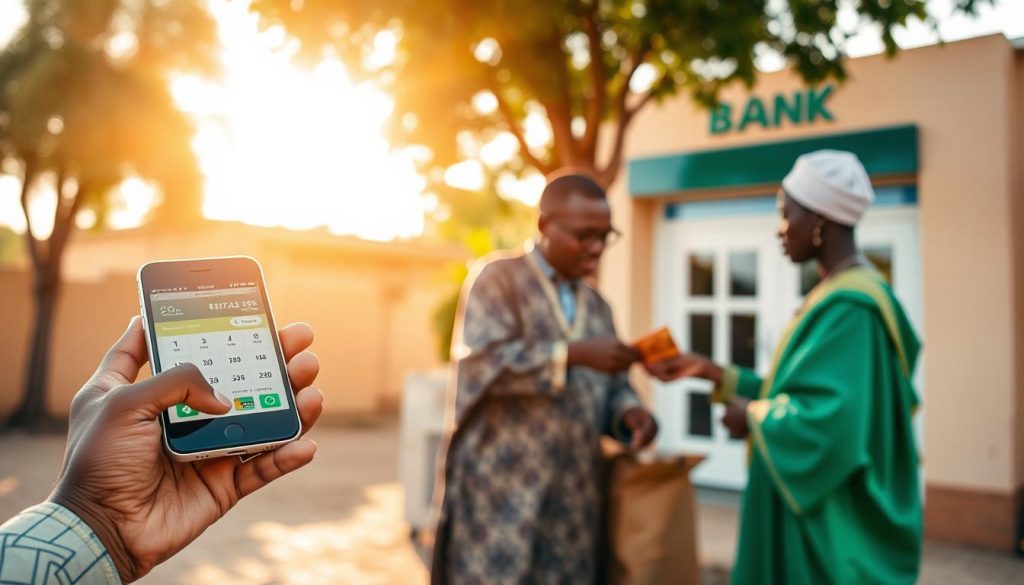
Credit, Debit, and Prepaid Travel Solutions
Credit and debit cards are convenient but not widely accepted outside the capital. Prepaid travel cards, on the other hand, offer a secure alternative. They allow you to load funds in advance and avoid foreign transaction fees. For example, cards like Monzo and Kroo provide fee-free withdrawals up to £200 per month.
When using cards, always choose the local currency to avoid extra conversion fees. Some ATMs may impose lower withdrawal limits, so plan accordingly. Digital tools like mobile payment apps can also enhance convenience, especially for smaller transactions.
Safeguarding Your Transactions
Safety is a top priority, especially when navigating busy roads or traveling at night. Avoid carrying large amounts of cash. Instead, use a money belt or hidden pouch for your funds. Notify your bank of your travel plans to prevent card issues.
Be cautious of scams when exchanging money. Stick to trusted sources like banks or authorized dealers. Keep a record of your transactions and monitor your accounts regularly. Here’s a quick comparison of payment options:
| Option | Pros | Cons |
|---|---|---|
| Credit Cards | Convenient, widely accepted in cities | High foreign transaction fees |
| Debit Cards | Direct access to funds | Limited acceptance, withdrawal fees |
| Prepaid Cards | Secure, no foreign fees | Limited reload options |
| Cash | Accepted everywhere | Risk of theft, counterfeit bills |
By balancing convenience and security, you can ensure a smooth financial experience during your trip. Whether you’re in the capital or on the road, these tips will help you stay prepared and protected.
Road Conditions and Transport Safety Tips
Navigating roads in unfamiliar regions requires careful planning and awareness. Whether you’re driving in cities or rural areas, understanding the local conditions can help you stay safe and avoid unnecessary risks. This section provides essential tips for handling road travel effectively.
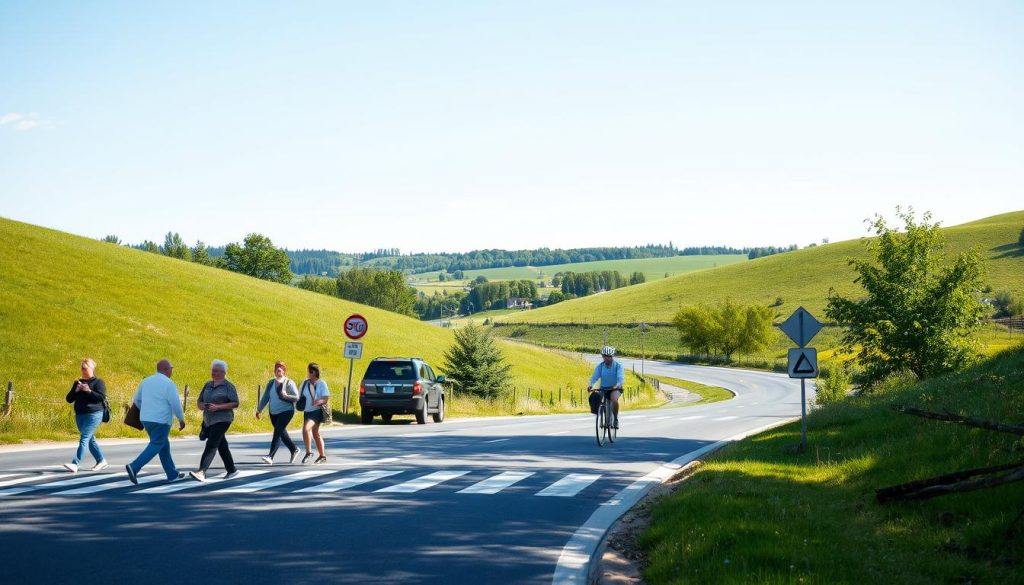
Navigating Urban and Rural Roads
Urban roads often face challenges like heavy traffic and driver carelessness. Overloaded vehicles are common, increasing the risk of accidents. In rural areas, road quality can vary, especially during the rainy season when paths may become impassable.
To minimize risks, plan your travel dates carefully. Avoid driving at night when visibility is low, and the likelihood of attacks or carjackings increases. Always keep your car in good condition and carry emergency supplies like water, fuel, and a first-aid kit.
Understanding Local Driving Regulations
Local driving regulations are essential to follow. Ensure you have a valid driver’s license and proper vehicle insurance. Police checkpoints are frequent, so carry all necessary documents to avoid delays.
Over the years, road conditions have improved in some areas, but challenges remain. Stay updated on recent trends and plan your route accordingly. Here’s a quick overview of key safety tips:
| Tip | Details |
|---|---|
| Plan Travel Dates | Avoid high-risk periods like rainy seasons or holidays. |
| Vehicle Maintenance | Ensure your car is in good condition before long trips. |
| Emergency Supplies | Carry water, fuel, and a first-aid kit at all times. |
| Documentation | Keep your license, insurance, and passport handy. |
By staying informed and prepared, you can navigate roads safely and enjoy a smoother travel experience. Always prioritize safety and remain vigilant, especially in unfamiliar areas.
Local Customs, Etiquette, and Business Practices
Understanding local customs is essential for respectful and meaningful interactions. In this vibrant central african country, blending French urban norms with traditional Muslim values creates a unique cultural landscape. Whether you’re in a bustling city or a rural village, adapting to these practices will enhance your experience as a visitor.
Social Etiquette and Cultural Considerations
In urban areas, French influences are evident in social interactions. Greetings are often formal, with handshakes being the norm. In rural regions, traditional Muslim values prevail, and modesty is highly respected. Dress conservatively, especially when visiting religious sites or interacting with elders.
As a visitor, showing respect for local traditions is crucial. For example, always use your right hand for greetings and eating, as the left hand is considered unclean. Politeness and patience are valued, so avoid raising your voice or showing frustration in public.
Tips for Conducting Business in Niger
Business practices in this central african country blend modern and traditional elements. In the city, formal attire is expected for meetings, and punctuality is appreciated. However, in rural areas, schedules may be more flexible, and building personal relationships is often more important than strict adherence to time.
Health protocols, such as vaccination requirements, can occasionally influence business practices. Ensure you’re up-to-date on routine immunizations and carry proof of vaccination if needed. This not only protects your health but also demonstrates professionalism.
“Respecting local customs and traditions is the foundation of successful business and social interactions in this region.”
By understanding these nuances, you can navigate both social and professional settings with confidence and respect. Whether you’re exploring the city or engaging with rural communities, cultural awareness will make your travel niger experience more enriching.
Health, Insurance, and Emergency Preparedness
Staying healthy and prepared is a top priority for any trip. Understanding the health requirements and having a solid emergency plan can make your journey safer and more enjoyable. From vaccinations to travel insurance, here’s what you need to know.
Required Vaccinations and Medical Facilities
Before you travel, ensure you’re up-to-date on essential vaccinations. Yellow fever is a must, and proof of vaccination may be required for entry. Malaria prophylaxis is also critical, as the disease is prevalent in many regions.
Medical facilities are limited, especially outside urban areas. Pack a travel medical kit with essentials like bandages, antiseptics, and any prescription medications. If you’re a driver, include items for roadside emergencies.
Emergency Contacts and Travel Insurance Advice
Comprehensive travel insurance is highly recommended. Look for policies that cover emergency medical services, evacuation, and repatriation. Notify your insurance provider of your travel plans to avoid coverage issues.
Keep a list of emergency contacts, including local hospitals and your country’s embassy. As a traveller, having these details on hand can save valuable time in a crisis.
“Travel insurance isn’t just a safety net—it’s peace of mind for any unexpected situation.”
By prioritizing your health and preparing for emergencies, you can focus on enjoying your trip. Whether you’re exploring cities or remote areas, these tips will help you stay safe and secure.
Visa, Passport, and Entry Requirements
Planning your trip starts with understanding the essential documents needed for entry. Whether you’re visiting for business or leisure, having the right paperwork ensures a smooth arrival at your destination. This section covers everything from passport validity to visa regulations and tips for navigating border crossings.
Document Validity and Visa Regulations
Your passport must be valid for at least six months beyond your planned departure date. This rule applies to all travelers, regardless of nationality. For visas, most visitors will need to apply in advance, though some countries offer e-visas or visas on arrival.
Check with your local embassy for the latest requirements. They can provide detailed information on application processes, fees, and processing times. Keep in mind that visa regulations can change, so verify the details closer to your travel date.
Tips for a Smooth Entry Process
To avoid delays, organize your documents in advance. Carry printed copies of your visa, flight itinerary, and accommodation details. Border officials may ask for proof of your travel activity, so having these on hand is essential.
Stay informed about any health requirements, such as vaccination certificates. Some destinations may require proof of immunization for diseases like yellow fever. Check with your embassy for specific health advisories.
“Preparation is key to a hassle-free entry process. Double-check your documents and stay updated on the latest regulations.”
By following these tips, you can ensure a smooth entry into your destination. Proper preparation not only saves time but also helps you focus on enjoying your trip.
Conclusion
A smooth trip starts with understanding the essentials of safe travel. From navigating the airport to choosing reliable taxi services, every detail matters. Always verify the quality of transportation options and ensure they meet safety standards.
When using local facilities, stay vigilant to avoid common scams like overcharging or robbery. Keep your belongings secure and opt for trusted providers. These precautions will help you enjoy a stress-free journey.
Use this guide as your go-to resource for planning and executing your trip. With these tips, you’ll feel confident and prepared for every step of your adventure. Safe travels!
The above is subject to change.
Check back often to TRAVEL.COM for the latest travel tips and deals.



